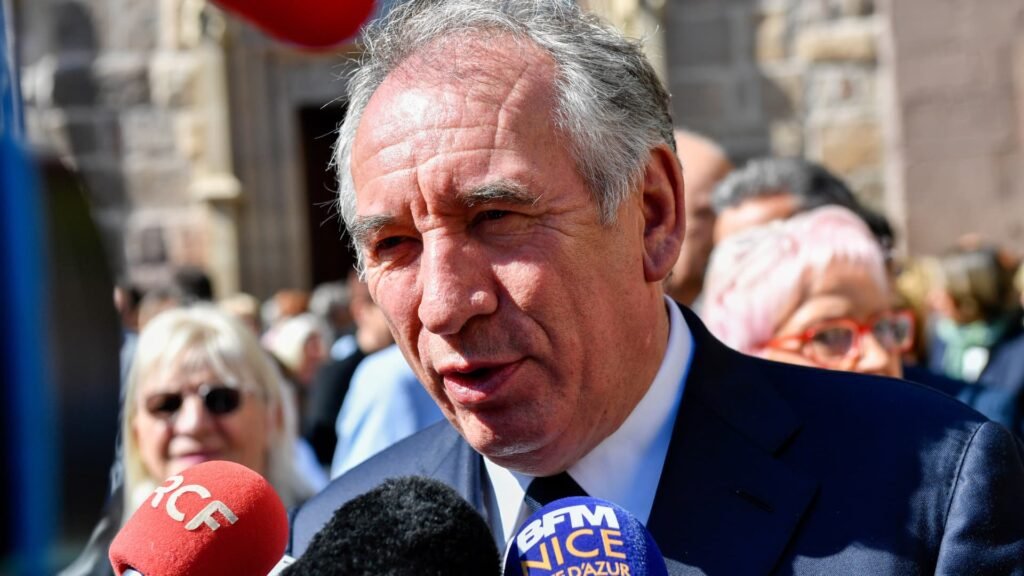FREJUS, FRANCE – 2023/05/03: The mayor of Pau François Bayrou is seen during the funeral of François Léotard. French politician and former Minister of Defense and Culture François Léotard died on April 25 at the age of 81. His funeral takes place in Frejus. (Photo by Laurent Coust/SOPA Images/LightRocket via Getty Images)
Sopa Images | Lightrocket | Getty Images
French President Emmanuel Macron on Friday named Francois Bayrou his new prime minister as political uncertainty is expected to continue to weigh on the country’s administration following the toppling of Michel Barnier’s government last week.
Centrist Bayrou marks the country’s fourth prime minister this year after Barnier resigned on Dec. 5 in the wake of an historic no-confidence vote, which saw an unlikely alliance between opposition parties on the left and far right.
The 73-year-old veteran politician has led France’s centre-right Democratic Movement since he founded it in 2007 and is a longtime ally of Macron. He will now be expected to form a new government in the coming weeks.
Speaking shortly after his appointment, Bayrou warned of “a long road” ahead in overcoming France’s political impasse, but added that he was determined to bring about unity.
“Everyone understands the difficulty of the task. Everyone says to themselves that there is a path to find that brings together the people instead of dividing them,” he told journalists, according to Reuters.
“I think that reconciliation is necessary,” he added, according to a Google translation.
Macron was expected to announce a successor a day after Barnier’s departure but, in a sign of the country’s political stalemate, that decision was delayed until this week. The president also missed a self-imposed 48-hour deadline he gave at a meeting of party leaders on Tuesday.
The delay reflects wider turmoil that his dogged French politics over recent months, with inconclusive legislative elections this summer and wider divisions over the hefty French deficit.
Macron called snap elections in June and July in a bid to shore-up his centrist alliance’s power base in the National Assembly, but instead emerged with a heavily-reduced power base.
Last week’s no-confidence vote — held after weeks of wrangling over 2025 budget plans to hike taxes and cut public spending — saw the left-wing New Popular Front (NFP) alliance and Marine Le Pen’s far-right National Rally (RN) support a motion against Barnier’s government. It marked the first time a French government has been ousted since 1962.
Barnier had served in office for just shy of three months, succeeding Gabriel Attal — who in January became France’s youngest prime minister in modern history — and Elisabeth Borne before him.
The incoming prime minister will now face many of the same pressures as his predecessor, with the left and right expected to harass the new government for their own agendas for the 2025 budget.

Le Pen, in a post on X, urged Bayrou to listen to the opposition in order to construct a “reasonable and thoughtful budget,” according to a Google translation. National Rally leader Jordan Bardella said that the party’s policy “red lines” remain, in comments reported by Reuters.
The leader of the Communist Party, Fabien Roussel, said on social media that Bayrou’s appointment was a “bad idea” and questioned whether the incoming prime minister would continue to push policy “that has failed and been punished,” according to a Google translation.
The National Rally, for its part, wants concessions to raise pensions, scrap planned cuts to medication reimbursements and reduce contributions to the European Union’s budget. The New Popular Front, meanwhile, wants to lift public spending and raise tax on super-profits and the wealthy.
As it stands, analysts think it’s likely that France’s major political blocs will agree a provisional budget, which simply rolls over the 2024 budget into next year. This will prevent any new year government “shutdown” where France is no longer able to meet its financial obligations.
Such a move would, however, delay the urgent need to tackle France’s fiscal problems, with the budget deficit already predicted to hit 6.1% of GDP in 2024, and is expected to rise further if measures are not taken to rein in spending.
Investors are currently looking cautiously toward France, with the yield on France’s benchmark 10 year government bond rising 5 basis points to around 3.01% following the announcement, slightly up from earlier in the session. The French CAC 40, meanwhile, dipped slightly to trade up 0.12%.
— CNBC’s Holly Ellyatt contributed to this report.


